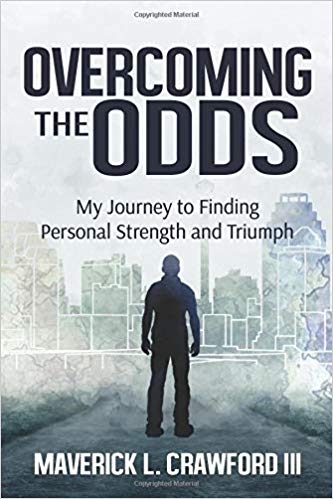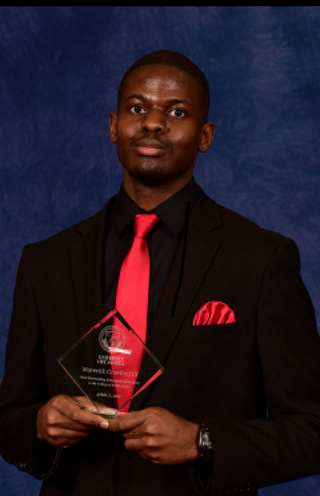1) Tell us an overview about your new book titled, “Overcoming the Odds: My Journey to Finding Personal Strength and Triumph”
My book is a memoir based on my challenges and obstacles that I had in my life such as autism, abuse, mental illness and much more. Its primarily a sad true story about a man with autism that no one had high hopes for: the doctor said that he would never amount to anything and would be institutionalized.

It took me a long time throughout my journey to find that personal strength and triumph because no one taught me anything about how to live life or survive as a black man in this world along with having a disability.
All of the odds were stacked against the author: he had autism, he was a fatherless black child, with a single parent mother in a dangerous community with low performing schools. He was bullied, had no friends, no one believed in him, experienced bad teachers, had disabilities along with autism. It seemed as if the author was unloved or born into the wrong family. His family or community had no knowledge or did not believe in autism or any mental or neurological illness. He felt hurt, betrayed, used and abused, to name a few.
The author wore many masks in the story to hide from the abuse and being an outcast but it did not work. He tried to block out or ignore the ignorance but that did not work. He tried to mimic a relative that was so perfect at what they did in order to fit in with family but that did not work. He pretended to be happy, that did not work. He tried to lie or cover over the abuse he went through to make the abusers look good but that did not work. He even tried the unthinkable. And that did not work. After all else had failed, he tried a different route which was the most positive route where I learn to discover my own personal strength and triumph.
2) What inspired you to write this book?
After everything I went through, and after giving a speech to 200 people about my journey on having autism, it hit me.
I was inspired when one of my professors told me, “Maverick we need more minority voices in the autism community.”
Meaning they need those of color to express their concerns and their stories about having and living with autism because there is not very many of us. Studies on autism suggest that Blacks and Hispanics are more likely than Whites to be underdiagnosed or diagnosed late in life with autism. The Black community does not understand mental health and neurological disorders because we do not have access to treatment in our community. We also do not report unusual behaviors in our children. We tend to write bad behavior as either bad behavior, being lazy or acting white. The reason why they are building more prisons than schools is that they observe the quote on quote “bad behavior” from minority kids and the system does not understand what minority kids have to go through.
A study points out that “Minority children suffer from a severe form of PTSD because of their environment.” So the minority children who are labeled “bad kids” like I was could be suffering from a neurological disorder like autism. Autism behaviors go unreported in the minority community because we simply do not understand what to look out for or what to expect. After doing research on autism and the Black community, I came up empty-handed when it came to Black and minority voices for autism. So, I looked back to the comment my professor made to me about the autism community needing more voices of diversity. I wrote this book because the autism community needs more people of color in its leadership. I want to help everyone take notice of how autism affects the Black community and a Black child.
3) What has been your biggest hurdle in life?
The worst beating I received in my life was being compared to other successful people with autism. Every time my court-appointed caretaker would see Dr. Temple Grandin or someone with autism who is a great success in life, I was beaten to the point of death, which was nearly every day. Those beating left me trying to catch my breath, and my whole life would pass through like a movie scene. I thought I was dead,but then I opened my eyes. My caretaker would say, Why can’t you be like Dr. Temple Grandin, or this person and that person, they are successful, doing great things, have jobs, in college while you’re just lazy, fat, retarded, slow, scared, can’t communicate, and you and they both have autism. I wish they were my siblings and not you, you disgust me, and every time I see this on television, and you’re not reaching your capabilities of having autism like Dr. Temple Grandin, I’m going to beat you.
Ever since then I saw thousands of successful people with autism do great things and for every time that happened, I was severely beaten for it. I struggled with watching or reading about somebody with autism or any mental illness or neurological illness doing spectacular things because it reminded me of those beatings. I respect my autism community and those who have succeeded, and I’m proud to have autism and see others succeed in having autism. But when I see it, the memories of the abuse I suffered come back. My biggest hurdle because of what I went through is trying to accept myself for who I am and not to compare myself to others, especially those on the spectrum. Because of my past and reliving the moments of the abuse, it has been a struggle for me to overcome not comparing myself and accepting myself as a person. But I’m working on it.
4) What has been your biggest success in life?

The biggest success in life was having autism and being different. My primary motivator for continuing to educate and helping those in the community is because of having autism.
Autism has allowed me to remain humble in the spirit and to take small steps into achieving my goals. The qualifications that I have that set me apart from other students is my perseverance, ambition, and humility. Perseverance because of the obstacles I have and continue to move forward. The word ambition defines me because I have a strong desire to achieve at the highest level, no matter what disability I have. Lastly, humility, one of my most significant qualifications, because I’m willing to allow my actions speak, by all of the contributions I’ve made in the community and school, without looking for anything in return.
The return I look forward to is how my contributions can influence others to achieve their dreams and contribute to society.
Having autism, you are going to feel like an outcast or at a disadvantage compared to your peers, but you have the power to overcome the obstacles. When going through the obstacles, remain steadfast because it shows commitment, remain humble because it shows perseverance. Remain positive because it shows ambition, and most importantly be yourself, be confident and stay strong because you have the ability to succeed in your own special way. Autism has motivated me to not only come out of my comfort zone but to be different and unique because it sets us apart from everyone. I am proud of having autism because it makes me special.
5) What do you hope for people to come away with after reading your book?
I hope that readers gain a new perspective on autism from a minority point of view, and that more people recognize the need for more diversity in the autism community. The book may bring tears to your eyes, joy to your hearts and many questions about how can a person like myself go through all of this pain and still comes out on top.
I dedicate this book to anyone autistic, abused or not, to read this book and believe in yourself. Believe that you can do anything you put your mind to. You may face opposition and intolerance for being different from others, but you are special and can achieve things in your own time, in your own special, magnificent way. Always be proud of you at the end of the day and never allow anyone to bring you down.
6) Where can people purchase your book?
Amazon and kindle, I’m looking to get my book into more places online soon.
Click here to buy Maverick’s book
7) How can people contact you?
By email maverickcrawford74@yahoo.com
8) What is next for Maverick Crawford?
I plan on writing a second book on autism in the Black community and expand on it. I’m currently in graduate school, employed, a member of state autism boards, a part of the Texas Partners in Policy-making class, and working as a volunteer advocate with Disability Rights of Texas. I plan to give more speeches on the topic of suicide prevention, bullying, abuse and autism in the near future.
I am thinking about creating a YouTube channel where I can do online speaking about different topics to try to inspire and motivate people. I would love to be a motivational speaker along with an advocate for children with special needs. My dream is to either become a lawyer or a social worker, so I can work directly with people and make an impact in their lives. Because people with autism make impacts in the lives they come in contact with.
A graduate of Abilene Christian University, Jennifer had a long career in TV Broadcasting. Upon learning her oldest son Sam had a form of Autism called Asperger’s Syndrome, she left her career and became a full-time mother to both of her sons. Jennifer elicited the participation of her family and together they produced several independent programs including a children’s animated series titled Ameriquest Kids, as well as a documentary and book titled, Coping to Excelling: Solutions for School-age Children Diagnosed with High-Functioning Autism or Aspergers Syndrome. She formed the nonprofit Asperger101 to provide on-going free resources related to ASD at Aspergers101.com and has implemented the Texas Driving with Disability Program and continues to grow the statewide initiative today. She and her husband have recently retired to their property in the Texas Hill Country.


